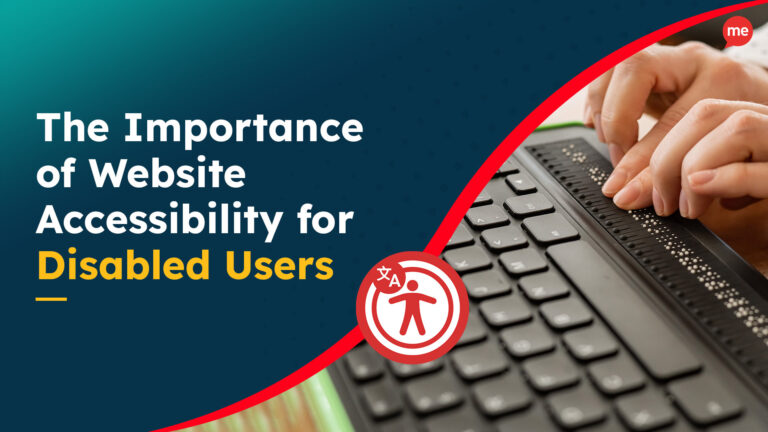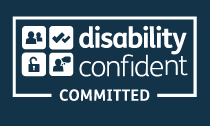July is Disability Pride Month. Celebrated every year to commemorate the passing of the landmark Americans with Disabilities Act (ADA) on July 26th, 1990, this month-long observance is a powerful platform to promote inclusivity, raise awareness about the rights of people with disabilities, and foster a society that embraces diversity.
Want to learn more about Disability Pride and what ADA legislation means for your business and your disabled customers and employees? Then you’re in the right place!
Why Should You Care About Disability Pride?
The short answer is that disabilities affect way more people than you may think, as one in four Americans has a disability. That’s over 61 million people.
For individuals with disabilities, Disability Pride Month provides a valuable opportunity to honor and embrace their unique identities, experiences, and contributions, celebrate their achievements, challenge societal stigmas, and advocate for their rights.
For organizations, Disability Pride initiatives provide a timely reminder to prioritize accessibility and ensure that all premises, products, services, and digital platforms are inclusive and welcoming to all. Plus, open discussion creates opportunities for employees, customers, and stakeholders alike to learn about the importance of diversity and inclusion.

Is it Really True That One in Four Americans is Disabled?
Yes, and we know that seems like a lot. But it’s essential to remember that not all disabilities are physical – or even visible.
There’s an outdated assumption that the term disability is synonymous with someone in a wheelchair – which isn’t entirely illogical, given that the wheelchair has become the international symbol of disability. Yet, of the 1 billion people worldwide with a disability, only 1% need a wheelchair.
Of course, people with physical disabilities do need to be supported. But people with hidden disabilities often need help too. For example, it’s estimated that within the American population:
- Around 14 million people have vision impairments like partial blindness, color blindness, or deaf-blindness (National Institutes of Health).
- Neurodivergent traits like dyslexia, dysgraphia, dyscalculia, and hyperlexia affect at least 20% of the population (CSR Wire).
- Around 5% of Americans have ADHD (Web MD).
- 1 in 8 Americans is affected by hearing loss (National Institute for Deafness and Other Communication Disorders).
What is the Americans with Disabilities Act?
The ADA is a landmark civil rights law prohibiting discrimination against individuals with disabilities. It aims to ensure equal opportunities in various aspects of life via the following key provisions:
ADA Title I
Title I of the ADA prohibits employment discrimination, requiring employers to make reasonable accommodations for qualified candidates and employees with disabilities. That means having an accessible website and providing employees an inclusive candidate journey. Any business with at least 15 full-time employees operating for 20 or more weeks every year is governed by ADA Title I regulations.
ADA Title II
Title II applies to state governments and local governments and prohibits discrimination against people with disabilities in all services, programs, and activities. Authorities and agencies are required to take steps to ensure communication is equally as effective for disabled citizens as for non-disabled residents, including the ability to:
File tax documents
Apply for an absentee ballot
Pay government fees and tickets
File a police report
Apply for state benefits
Enroll in school programs
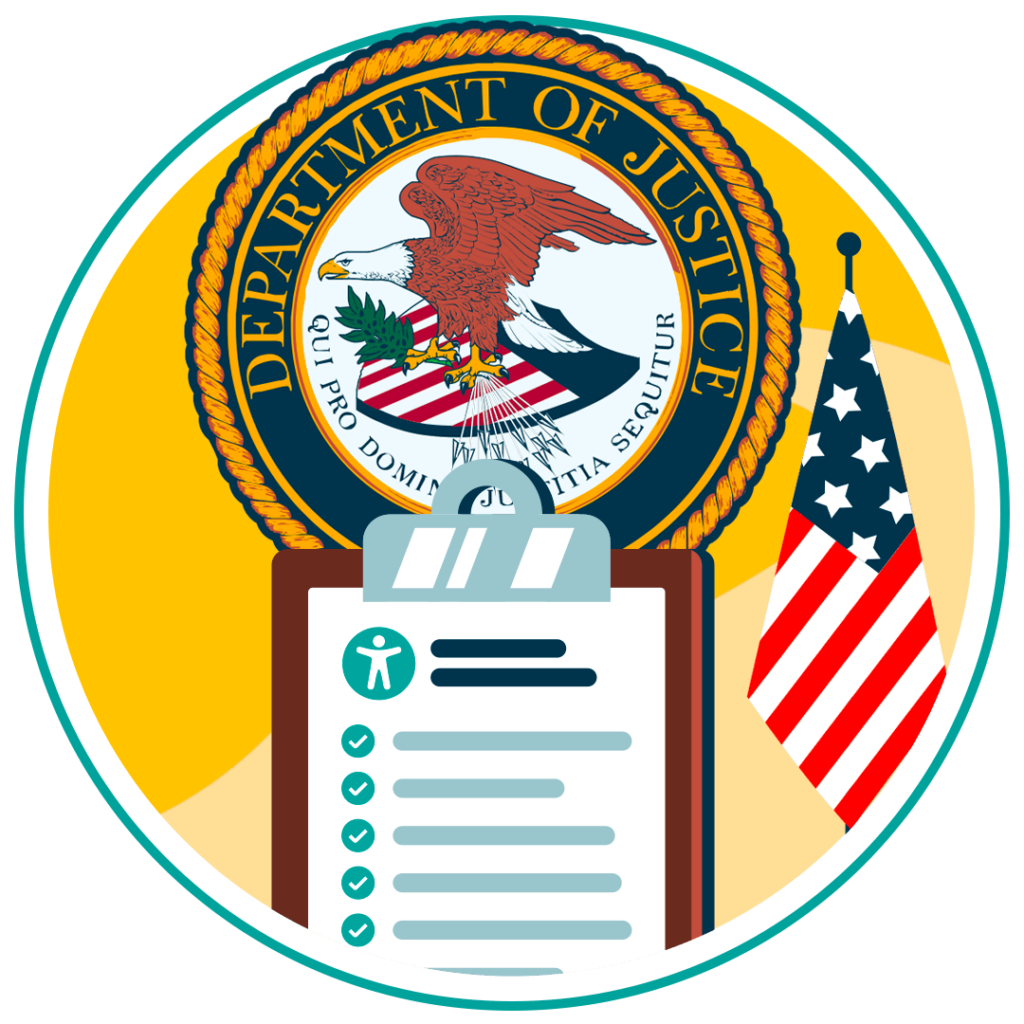
ADA Title III
Title III of the Americans with Disabilities Act stipulates that all public-facing businesses, including nonprofits, make reasonable adjustments to provide full and equal enjoyment of their goods, services, facilities, privileges, advantages, or accommodations to people with disabilities. Examples of businesses and facilities that fall under Title III include:
Banks
Retail stores
Restaurants and bars
Hotels, inns, and motels
Hospitals and medical offices
Auditoriums, theaters and sports arenas
Section 508 Amendment to the Rehabilitation Act
Section 508 is a US accessibility law that relates specifically to electronic information and communication technology at the Federal level. Its states that, regardless of the type of medium of the technology:
Federal employees with disabilities must have equal access to, and use of, information and data as their non-disabled counterparts.
Members of the public seeking information or services from a Federal department or agency must have comparable access to, and use of, information and data as non-disabled citizens.
Stay ahead of the game when it comes to Digital Accessibility laws and compliance in the United States. Learn about all the different federal and state-level regulations, see real examples of web accessibility lawsuits in different regions and discover a 7-step action plan for building accessible websites.
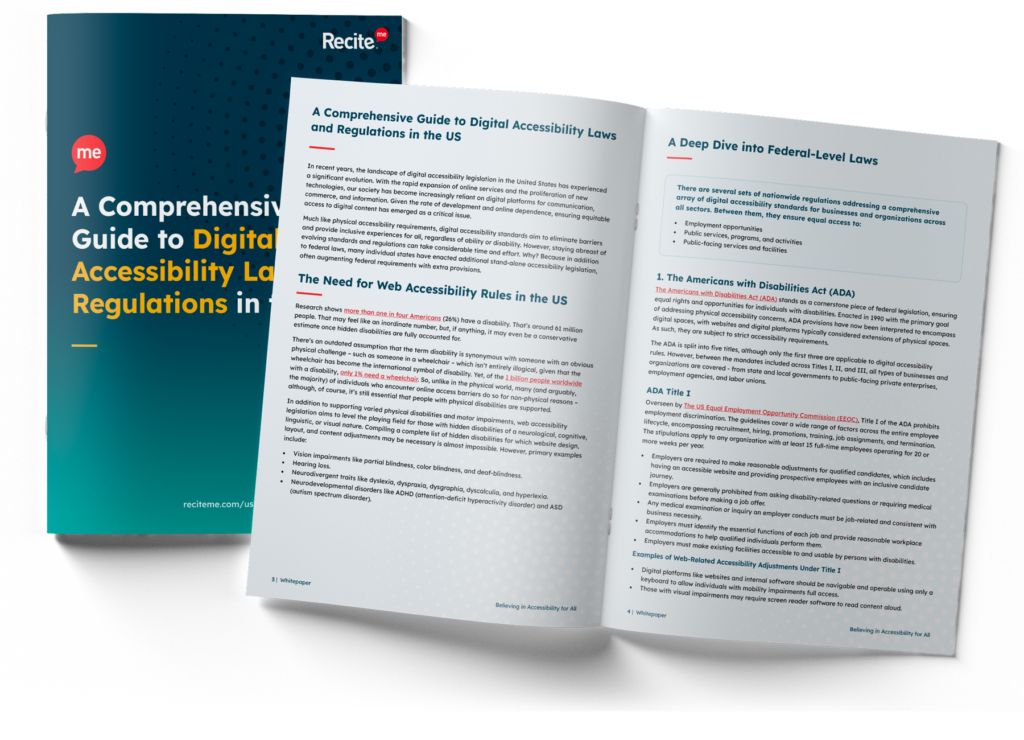
What Does the ADA Mean for Business?
Complying with the ADA and providing everyone with equal access to digital products and services is the right thing to do. However there are several other reasons to provide fair and equitable experiences for disabled clients, customers, and employees.
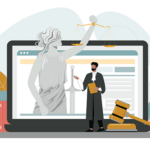
Investigations and Lawsuits
The Department of Justice (DOJ) may initiate investigations into businesses suspected of ADA violations. Plus, both private individuals and disability advocacy organizations can file lawsuits against companies for ADA violations, seeking monetary damages and injunctive relief to enforce compliance. 2023 saw a total of 4,605 ADA website-based lawsuits, with 3,086 filed as federal suits and 1,519 filed as state suits.
While the list of potential pitfalls is lengthy, the highest volume of ADA violations stems from failure to make products and services equally accessible to individuals with disabilities, as per Title III.
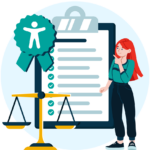
Revenue
At first glance, the link between accessibility and revenue growth may not be so obvious. But in fact, accessibility is one of the key drivers affecting number of sales and customer retention. A study by Accenture found that companies who prioritize accessibility practices saw revenue increases averaging 28% over a four-year period.
There are numerous mechanisms at play here. As products and services become more accessible, they attract a wider audience, encourage higher rates of customer satisfaction, and ultimately lead to repeat business and customer loyalty. All of these factors contribute to increased sales and higher revenues.

Brand Reputation
Businesses that don’t prioritize accessibility may face reputational damage, negative publicity, and further loss of custom from consumers who value inclusive practices. Modern-day consumers are becoming more and more socially conscious in their purchasing habits, with reports suggesting that 52% of online consumers consider a company’s values when making a purchase. The bottom line is that if your company isn’t seen as inclusive, many customers will just take their dollars and spend them elsewhere.
Be sure to check out our ADA Website Compliance Checklist to see how you can implement best practices.
ADA-compliant Solutions for Business Owners
There are a number of different ADA Compliance Solutions that businesses can look to implement. At Recite Me we specialize in digital accessibility, helping businesses become more inclusive and accessible online. Two of the different ways Recite Me helps organizations become more ADA compliant is through our Accessibility Checker and Toolbar products.
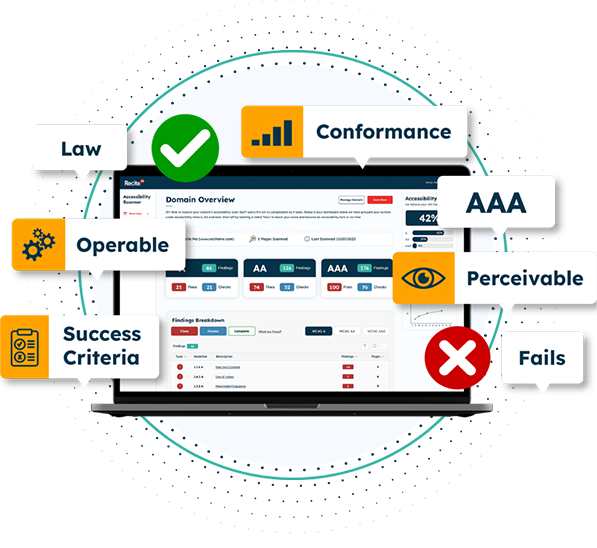
The Recite Me Accessibility Checker
Our Accessibility Checker can help address ADA non-compliance and inaccessibility at its root cause. As the tool performs a complete scan of your website in line with the latest WCAG standards and guidelines. By following a simple four step process to help improve your websites accessibility:
- Step 1: Scan Your Domains – Choose between scanning single or multiple pages.
- Step 2: Identify Accessibility Issues – Identify the locations of accessibility issues on your website.
- Step 3: Fix Accessibility Errors – Boost your accessibility score by prioritizing fixes in line with WCAG Levels A, AA, and AAA.
- Step 4: Track Your Progress – Create and share custom reports with your team and roadmap the next issues in your fix queue.
Reach out and schedule a demo with our team today.
The Recite Me Accessibility Toolbar
The Recite Me Accessibility Toolbar is a simple software that installs on to your website to help make it more inclusive. This can be important for your business and its customers, as it allows users to customize your website in a way that works best for them. Some of the main features include:
- Personalising font size, type, and color options.
- Choosing the exact color contrast between the text and background.
- Utilizing the mask screen tool to help with focus.
- Using the ruler tool to make reading easier.
- Downloading content as an audio file as an alternative to reading.
- Converting page content into over 100 on-screen languages.
- Having the page read aloud in a choice of 65 languages.
- Customizing PDF documents or having them read aloud/ translated.
- Zooming in on any part of a webpage.
- Using the built-in spell-checker and a fully integrated dictionary and thesaurus.
Reach out and schedule a demo with our team today.
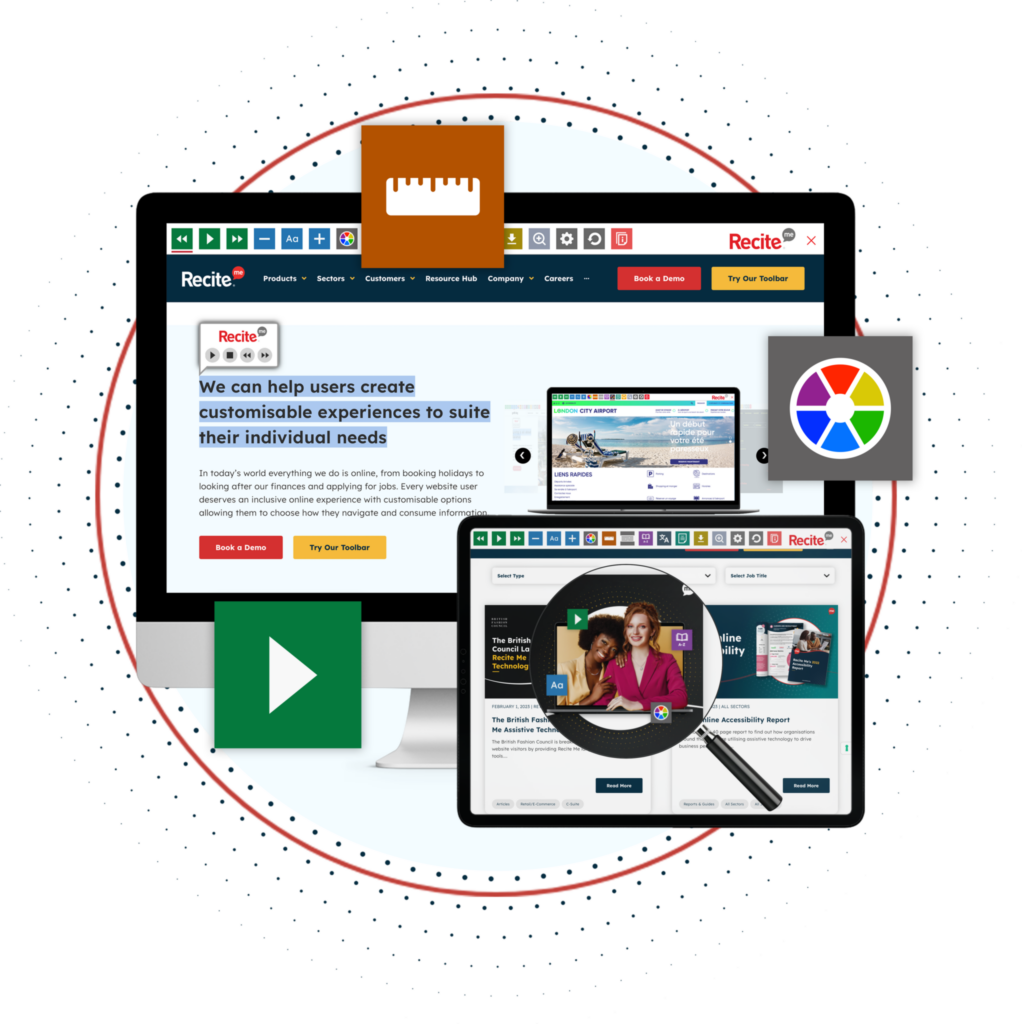
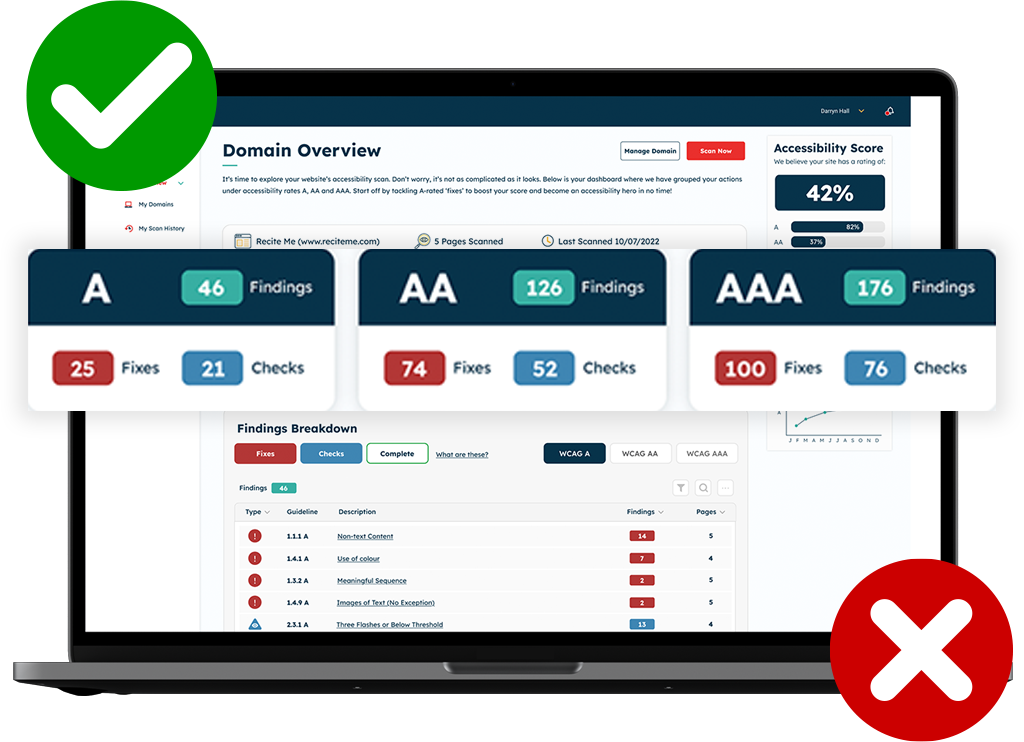
Free ADA Compliance Check of your Website
Detecting ADA Compliance issues has never been easier than it is now. At Recite Me, we offer a free automated scan of your websites homepage. This will identify and highlight any non-compliance on your website. Followed by recommendations on how to implement the necessary changes to improve your websites accessibility score and standing.



